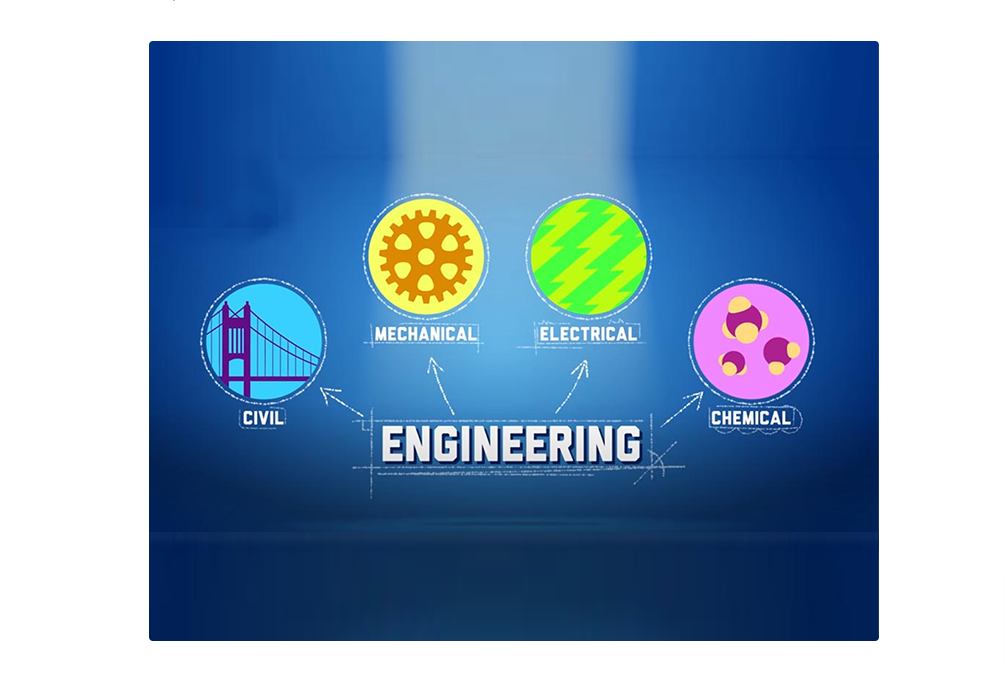Engineering covers a lot and uses science to design, build, and fix structures, machines, and systems. Engineers solve problems, invent stuff, and help make our world better. This article discusses the different types of engineering, their importance, and answers common questions.
Engineering Types Civil Engineering:
They design, build, and maintain things like roads, bridges, buildings, and water systems. They make sure these things are safe, lasting, and effective.
Mechanical Engineering:
They design and make mechanical systems. These include engines, machines, and heating and cooling systems. Using physics and materials science, mechanical engineers make useful products.
Electrical Engineering:
They work with electricity, electronics, and magnetism to design and make electrical systems, including power generation and electronic devices.
Chemical Engineering:
They use chemistry, biology, and physics to develop processes to produce chemicals, pharmaceuticals, and more. They work in a range of industries, like manufacturing, healthcare, and environmental protection.
Computer Engineering:
They combine electrical engineering with computer science to make computer hardware and software. They optimize computing systems, from very small microprocessors to complex software.
Environmental Engineering:
They work on solving environmental issues. This includes waste management, controlling pollution, and sustainable development. They aim to protect nature and people’s health.
Aerospace Engineering:
They design and make aircraft, spacecraft, and more. They innovate in things that fly, from commercial airplanes to space vehicles. Engineers’ Role Engineers help technology and society move forward. They: Innovate: Make new tech and improve existing ones. Design: Draw plans for systems and structures. Analyze: Use math and science to problem-solve.
Build: Manage construction and establishment of designs.
Test: Check design functionality and safety. Maintain: Make sure systems and structures work right and effectively.
Frequently Asked Questions (FAQs)
Q1: What training do you need to be an engineer?
A: Generally, engineers need a bachelor’s degree in engineering. Some jobs require advanced degrees and licenses as well.
Q2: How is engineering important to society?
A: Engineering is crucial for improving society. From designing structures to solving issues, engineers better life quality, spur economic growth, and take on environmental and health problems.
Q3: How do engineers make sure their designs are safe and trustworthy?
A: Engineers follow strict standards to make designs safe and reliable. They test thoroughly and stick to industry rules and best practices to lessen risks.
Q4: What’s new in engineering?
A: Developments in artificial intelligence, renewable energy tech, smart cities, and biomedical engineering are changing the future of engineering and society.
Q5: How do engineers help with sustainability?
A: Engineers develop sustainable technologies, use resources smartly, and design systems with less environmental impact. They work on renewable energy projects and waste reduction to promote a greener future.
Q6: What skills do engineers need?
A: Engineers need strong analytical and problem-solving skills, good at math and science, great communication, creativity, and teamwork. They also need to keep up with new tech and industry trends.
Q7: Can you specialize in a specific area of engineering?
A: Yes, engineers can specialize. For example, a mechanical engineer might focus on cars, robots, or heating systems. Specializations help engineers become experts and boost their careers.
Conclusion
Engineering is a diverse field that pushes innovation. Engineers solve complex problems and make our world better, whether through building stuff, creating new tech, or promoting sustainability. Their work is vital to our society. As tech continues to grow, engineers will play an important part in shaping our future. This detailed overview helps to understand engineering, its various types, and answers common questions. Engineers are key in overcoming global challenges and advancing tech, making it an appealing and significant career choice.
